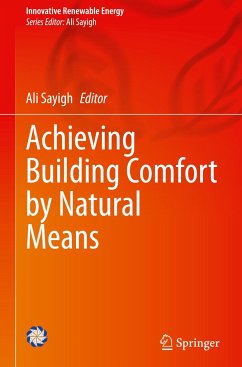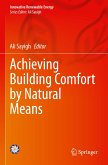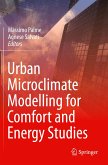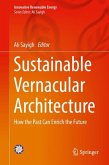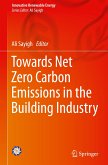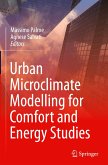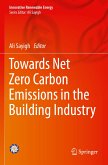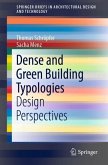Achieving Building Comfort by Natural Means
Herausgegeben:Sayigh, Ali
Achieving Building Comfort by Natural Means
Herausgegeben:Sayigh, Ali
- Gebundenes Buch
- Merkliste
- Auf die Merkliste
- Bewerten Bewerten
- Teilen
- Produkt teilen
- Produkterinnerung
- Produkterinnerung
Achieving Building Comfort by Natural Means explores examples of green building designs and methods that are currently being used around the world to achieve human comfort in buildings. The operation of buildings accounts for more than 40% of total energy use and is a major source of carbon emissions. It is imperative that this consumption be substantially decreased and that energy needed for building comfort is obtained from renewable and environmentally friendly sources. This book brings together a global group of contributors who look at factors such as location, climate, building…mehr
Andere Kunden interessierten sich auch für
![Achieving Building Comfort by Natural Means Achieving Building Comfort by Natural Means]() Achieving Building Comfort by Natural Means85,99 €
Achieving Building Comfort by Natural Means85,99 €![Urban Microclimate Modelling for Comfort and Energy Studies Urban Microclimate Modelling for Comfort and Energy Studies]() Urban Microclimate Modelling for Comfort and Energy Studies160,49 €
Urban Microclimate Modelling for Comfort and Energy Studies160,49 €![Sustainable Vernacular Architecture Sustainable Vernacular Architecture]() Sustainable Vernacular Architecture139,99 €
Sustainable Vernacular Architecture139,99 €![Towards Net Zero Carbon Emissions in the Building Industry Towards Net Zero Carbon Emissions in the Building Industry]() Towards Net Zero Carbon Emissions in the Building Industry85,99 €
Towards Net Zero Carbon Emissions in the Building Industry85,99 €![Urban Microclimate Modelling for Comfort and Energy Studies Urban Microclimate Modelling for Comfort and Energy Studies]() Urban Microclimate Modelling for Comfort and Energy Studies108,99 €
Urban Microclimate Modelling for Comfort and Energy Studies108,99 €![Towards Net Zero Carbon Emissions in the Building Industry Towards Net Zero Carbon Emissions in the Building Industry]() Towards Net Zero Carbon Emissions in the Building Industry85,99 €
Towards Net Zero Carbon Emissions in the Building Industry85,99 €![Dense and Green Building Typologies Dense and Green Building Typologies]() Thomas SchröpferDense and Green Building Typologies47,99 €
Thomas SchröpferDense and Green Building Typologies47,99 €-
-
-
Achieving Building Comfort by Natural Means explores examples of green building designs and methods that are currently being used around the world to achieve human comfort in buildings. The operation of buildings accounts for more than 40% of total energy use and is a major source of carbon emissions. It is imperative that this consumption be substantially decreased and that energy needed for building comfort is obtained from renewable and environmentally friendly sources. This book brings together a global group of contributors who look at factors such as location, climate, building materials, energy management, ventilation, thermal environmental conditions, shading, lighting, acoustics, and more that are critical for achieving buildings that are more sustainable.
Thermal comfort and climatic potential of ventilative cooling in Italian climates is available open access under a Creative Commons Attribution 4.0 International License via link.springer.com.
Thermal comfort and climatic potential of ventilative cooling in Italian climates is available open access under a Creative Commons Attribution 4.0 International License via link.springer.com.
Produktdetails
- Produktdetails
- Innovative Renewable Energy
- Verlag: Politecnico di Torino / Springer / Springer International Publishing / Springer, Berlin
- Artikelnr. des Verlages: 978-3-031-04713-8
- 1st ed. 2022
- Seitenzahl: 520
- Erscheinungstermin: 30. Oktober 2022
- Englisch
- Abmessung: 241mm x 160mm x 34mm
- Gewicht: 934g
- ISBN-13: 9783031047138
- ISBN-10: 3031047133
- Artikelnr.: 63677086
- Herstellerkennzeichnung Die Herstellerinformationen sind derzeit nicht verfügbar.
- Innovative Renewable Energy
- Verlag: Politecnico di Torino / Springer / Springer International Publishing / Springer, Berlin
- Artikelnr. des Verlages: 978-3-031-04713-8
- 1st ed. 2022
- Seitenzahl: 520
- Erscheinungstermin: 30. Oktober 2022
- Englisch
- Abmessung: 241mm x 160mm x 34mm
- Gewicht: 934g
- ISBN-13: 9783031047138
- ISBN-10: 3031047133
- Artikelnr.: 63677086
- Herstellerkennzeichnung Die Herstellerinformationen sind derzeit nicht verfügbar.
Professor Ali Sayigh, He is a UK Citizen, Graduated from London University, & Imperial College, BSC.AWP, DIC, PhD, in 1966. He is Fellow of the Institute of Energy, and Fellow of the Institution of Engineering & Technology, Chartered Engineer, Chairman of Iraq Energy Institute, and Fellow of the Royal Society of Arts. Prof Sayigh taught in Iraq, Saudi Arabia, Kuwait, Reading University and University of Hertfordshire From 1966 - 2004. He was Head of Energy Department at Kuwait Institute for Scientific Research (KISR) and Expert in renewable energy at AOPEC, Kuwait from 1981-1985. He started working in solar energy in September 1969. In 1972, he established with some colleagues in Saudi Arabia "The Journal of Engineering Sciences" in Riyadh, Saudi Arabia and in 1984 he established International Journal for Solar and Wind Technology, as an Editor-in-Chief. This has changed its name in 1990 to Journal of Renewable Energy. He is editor of several International journal published in Morocco, Iran, Bangladesh, Nigeria and India. He established WREN and the World Renewable Energy Congress in 1990. Member of various societies related to climate change and renewable energy. He is Chairman of Iraq Energy Institute since 2010. He was consultants to many national and international organizations, among them, the British Council, ISESCO, UNESCO, UNDP, ESCWA, UNIDO and UN. He run conferences and Seminars in 54 different countries, published more than 600 papers. He edited, written and associated in more than 100 books. He supervised more than 82 MSc. and 36 PhD students. He is editor-in- chief of the yearly Renewable Energy Magazine, 2000-2016. He is the founder of WREN and Renewable Energy Journal published by Elsevier & was the Editor-in-chief for 30 years from 1984 - 2014. He is the Editor-in-chief of Comprehensive Renewable Energy coordinating 154 top scientists, Engineers and researchers' contribution in eight volumes published in 2012 by Elsevier which won 2013 PROSE award in USA. He is the founder of Med Green Buildings and Renewable Energy Forum since 2011. In 2016 he established peer review international open access journal called "Renewable Energy and Environmental Sustainability" - REES, which is published in English on line by EDP publisher in Paris. Winner of the Best Clean Energy Implementation Support NPO - UK. In 2018 WREN was rated globally is one of the best organization in the UK promoting renewable energy. In November 2018, Prof. Sayigh was elected fellow of the Royal Society of Art, (FRSA). Prof Sayigh is working with Springer Nature in publishing books and proceedings since 2014 and up to now.
1) Sustainable schools: their passive systems to provide comfort with natural means as an educational example for pupils and their parents2) Living bricks can generate energy in the home and wean humanity off fossil fuels3) High Comfort - Low Impact: Integration of thermal mass in Pursuit of Designing Sustainable Buildings4) Enhancing the microclimate towards outdoor thermal comfort in Urban Isles of the Mediterranean Region5) "Energy management & savings in the domestic situation, A Case Study"6) Adoptable and Sustainability for visual and perceptive comfort: Neuroscience and Architecture7) Keeping cool under the hot Arewa Sun; natural cooling systems in Traditional Hausa Buildings in Nigeria8) The role of shading, natural ventilation, daylighting and comfort in enhancing indoor environmental quality and liveability in the age of COVID-199) Diachronic analysis of daylight design and management techniques in Mediterranean Region10) Passive Solar Design: The influence of building Geometry and Orientation on Solar Performance of Mosque in the Tropics11) Thermal and Visual Adaptive Comfort: Field Studies in Portugal12) "Rethinking building habitat for comfort and human wellbeing:Digital technologies for nature-based design"13) Renovating Heritage Buildings into Daylit Enjoyable and Visually Comfortable Museums/Galleries 14) Assessment of Indoor Heat Gain using Overall Thermal Value (OTTV) in the Rural Houses of Andhra Pradesh, India15) Climate- Sensitive Architecture, is natural comfort possible?16) "Design Elements of Building Comfort in Arid Zone of Arabian Countries The Significance Role of Orientation and Courtyard"17) Providing thermal comfort for buildings' inhabitants through natural cooling and ventilation systems: Wind Towers18) Thermal comfort and climatic potential of ventilative cooling in Italian climates 19) Energy retrofit of traditional buildings in a warm -humid urban climate
1) Sustainable schools: their passive systems to provide comfort with natural means as an educational example for pupils and their parents2) Living bricks can generate energy in the home and wean humanity off fossil fuels3) High Comfort - Low Impact: Integration of thermal mass in Pursuit of Designing Sustainable Buildings4) Enhancing the microclimate towards outdoor thermal comfort in Urban Isles of the Mediterranean Region5) "Energy management & savings in the domestic situation, A Case Study"6) Adoptable and Sustainability for visual and perceptive comfort: Neuroscience and Architecture7) Keeping cool under the hot Arewa Sun; natural cooling systems in Traditional Hausa Buildings in Nigeria8) The role of shading, natural ventilation, daylighting and comfort in enhancing indoor environmental quality and liveability in the age of COVID-199) Diachronic analysis of daylight design and management techniques in Mediterranean Region10) Passive Solar Design: The influence of building Geometry and Orientation on Solar Performance of Mosque in the Tropics11) Thermal and Visual Adaptive Comfort: Field Studies in Portugal12) "Rethinking building habitat for comfort and human wellbeing:Digital technologies for nature-based design"13) Renovating Heritage Buildings into Daylit Enjoyable and Visually Comfortable Museums/Galleries 14) Assessment of Indoor Heat Gain using Overall Thermal Value (OTTV) in the Rural Houses of Andhra Pradesh, India15) Climate- Sensitive Architecture, is natural comfort possible?16) "Design Elements of Building Comfort in Arid Zone of Arabian Countries The Significance Role of Orientation and Courtyard"17) Providing thermal comfort for buildings' inhabitants through natural cooling and ventilation systems: Wind Towers18) Thermal comfort and climatic potential of ventilative cooling in Italian climates 19) Energy retrofit of traditional buildings in a warm -humid urban climate

